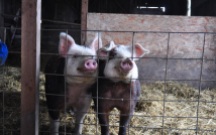I started Christmas shopping.
It was a dismal affair. Mainly because my inner Grinch decided to come along with me. In fact, I had quite an entourage roaming the mall with me, once you figure in the fictional characters that are always lurking at the back of my consciousness.
As usual, I began wondering what Rose would be doing. But instead of her being knee-deep in gift-giving ideas, I found her in a much messier bog.
Believe it or not, Christmas is hardly an afterthought for Rose this time of year. There’s no tree yet. No decorated house. If she’s making presents, she has started them, but gifts are a task to be addressed when the other chores are finished.
No. Early December has Rose knee-deep in the gory, cold, slushy mess of hog butchering. And I think she’s a bit traumatized by it all.
Without going into a lot of detail¹, butchering a hog is ugly business: first the animal is killed (shot with a 22 today; I can’t find any accounts of how they killed them c1930), then bled by cutting the jugular and hung from its front or hind legs, after which it has to be scalded and scraped to remove all its hair before it can be gutted and cut into those familiar cuts we buy from the grocery store. Add to this the fact that it’s cold outside (the best time to butcher a hog, it seems, is when the daytime high is around 40º F… so, early December) and everyone involved is wet. Definitely not something your average city girl is ready for.
Can you picture Rose? Her finger-waved hair pristinely styled? Looking every inch the patrician, even bundled as she is in a pair of Harold’s old overalls, oversized red rubber overs, and mackinaw.
But more than the discomfort of the task, and the inherent gore, Rose has watched these pigs grow from cute little newborn piglets into the market hogs from which a good portion of their living is made. It has been her job, since their birth, to watch over them, feed them, keep them healthy.
She is attached to these little piggies.
I know this because I am attached to these little pigs from the Kitchen’s Garden blog I follow.²
My point being, if I can become attached via cyberspace to piggies that are destined to find their way to a dinner table, how much easier to be bewitched by the little darlings when in person.
No amount of saying “These pigs are for food” can protect the heart.
So there Rose stands. Her boots covered in mud and blood, her hands cold and wet and covered in tiny hairs scraped from her piggy’s hide, tears streaming down her face as she remembers how cute the piglets were when they came running to her for their supper, how they followed her up and down the fence line on the off chance she had a little nibble hidden away in her apron, how she sat up one night to nurse one of them back to health.
Sure, she knew, ultimately, this was their December fate. But it hardly prepared her…
Footnotes…
¹ If you’d like a peek at the modern-day gory details of hog butchering, these sites have step by step instructions (BE WARNED – pictures are graphic): The Elliot Homestead; Backwoods Home.
² I started following The Kitchen’s Garden blog to learn more about small working farms, but have since decided that its author, Miss C, is the 21st Century personification of my Rose. You won’t regret keeping up with her daily blog.
AND… her photography is beautiful, as attested to by the pig pictures (from her site).
…and additional sources
An encyclopedia page filled with trivia of the porcine variety







I love your writing and feel a strong familial tie to Rose. And now I might become a vegetarian!
LikeLike
Although I have 5 hogs going off this next week I am very, very glad to be able to leave the killing to the professionals. Rose is (was?) a very strong woman. Thank you for the shout out! c
LikeLike
Amazing. So much hard work — and that’s for one animal. I think raising it and then participating in the killing and scraping and all the other work, and then the use of all its parts — bones, blood pudding, meat distributed or sold… all of that ought to make people not vegetarians but more respectful of where their food comes from and what it entails.
It’s odd, though, that it doesn’t. Many people in Rose’s time just got on with the job, as it were, and didn’t always think about the animals. And some people who work in industrial processing now just don’t get paid enough or care enough to treat the animals humanely (thinking of the really good book I read, Marina Lewycka’s Two Caravans, part of which features temporary workers at a chicken processing plant…).
LikeLike
Goodness, those piggies are adorable. I don’t think I’d have the heart to do it, though my husband has (growing up on a ranch) since he was a teen.
LikeLike
I agree. My dad also was involved in butchering since he was a teen but I don’t think I could do it. Especially if I raised the pigs from babies.
LikeLiked by 1 person